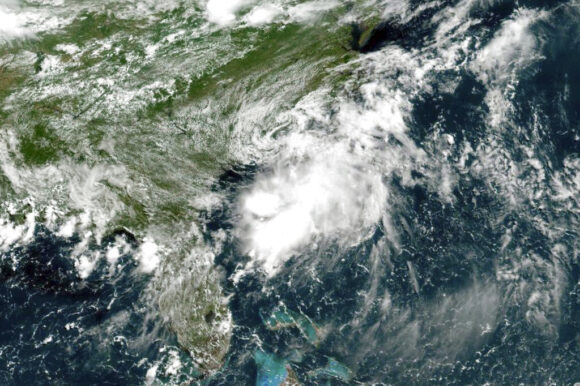MIAMI (AP) — Tropical Storm Colin disintegrated in North Carolina on Sunday after forming along the South Carolina coast on Saturday morning, bringing rain and winds that disrupted July 4 celebrations and left one man dead.
The North Carolina man drowned in the water off Oak Island and a handful of other swimmers in the area required assistance Sunday, authorities said.
A news release from the town of Oak Island said responders arrived Sunday afternoon to find the 52-year-old from Hickory had been pulled to shore and bystanders were administering CPR. Emergency medical personnel performed resuscitation efforts for over 30 minutes before pronouncing the man dead, the news release said.
Sunday’s deadly incident was among more than a half dozen calls for “rescue” in the Oak Island and Caswell Beach areas as of late Sunday afternoon, the town said.
The water remained unsettled due to Tropical Storm Colin and officials upgraded the beach warning system to a red flag, indicating a high risk of rip and longshore currents and dangerous surf conditions.
By late Saturday night, Colin had weakened into a tropical depression and forecasters discontinued the tropical storm warning that had been in effect for parts of the North Carolina coast.
At 11 p.m. EDT Saturday, the storm’s center was about 15 miles (20 kilometers) north of Wilmington, North Carolina, with maximum sustained winds of 35 mph (55 kph). It was moving northeast at 7 mph (11 kph).
The storm is expected to further weaken and dissipate completely by Sunday night or Monday morning.
“Colin will continue to produce locally heavy rainfall across coastal portions of North Carolina through Sunday morning, where an additional 1 to 2 inches of rainfall is possible,” the center said.
Some Fourth of July celebrations planned Saturday in Charleston, South Carolina, were canceled after significant water had pooled on the field at Joseph P. Riley Jr. Park and more rain was expected.
“Obviously, we’re disappointed,” said Scott Watson, the city’s director of cultural affairs. “This promised to be a great family event, and we hate to have to cancel.”
Organizers were also forced to cancel a festival planned in Southport, North Carolina.
“The safety of Festival goers, vendors, volunteers, emergency workers and everyone is our highest priority,” festival spokesperson Trisha Howarth said in a statement.
Separately, the center of Tropical Storm Bonnie rolled into the Pacific on Saturday after a rapid march across Central America, where it caused flooding, downed trees and forced thousands of people to evacuate in Nicaragua and Costa Rica. There were no immediate reports of deaths.
By Saturday night, Bonnie was centered about 165 miles (270 kilometers) south of San Salvador, El Salvador, with maximum sustained winds of 60 mph (95 kph). It was moving to the west at 17 mph (28 kph).
It’s one of the rare storms to make an Atlantic to Pacific crossing without losing tropical storm force, thus maintaining its name. Forecasters said Bonnie is likely to become a hurricane by Monday off the southern coast of Mexico, but is unlikely to make a direct hit on land.
Many Nicaraguans still remember Hurricane Joan, a powerful 1988 storm that wreaked havoc on the coast and caused almost 150 deaths in the country.
“We are waiting for the storm to hit, hoping that it won’t destroy our region,” Bluefields resident Ricardo Gomez, who was 8 when Joan hit, said before Bonnie arrived.
The area was also battered by two powerful hurricanes, Eta and Iota, in quick succession in 2020, causing an estimated $700 million in damage.
Officials in Costa Rica expressed concern that the storm would unleash landslides and flooding in an area already saturated by days of rain. The government said seven shelters in the northern part of the country already held nearly 700 people displaced by flooding.
About the photo: This GOES-East geocolor image provided by NOAA and taken at 11:30 a.m., Saturday, July 2, 2022, shows Tropical Storm Colin of the Atlantic coast of the United States. Tropical Storm Colin formed along the South Carolina coast on Saturday, bringing the threat of rain and high winds for a day or two during the holiday weekend before improving for Monday’s July Fourth celebrations. (NOAA via AP)
Was this article valuable?
Here are more articles you may enjoy.


 Moody’s: LA Wildfires, US Catastrophes Drove Bulk of Global Insured Losses in 2025
Moody’s: LA Wildfires, US Catastrophes Drove Bulk of Global Insured Losses in 2025  AIG’s Zaffino: Outcomes From AI Use Went From ‘Aspirational’ to ‘Beyond Expectations’
AIG’s Zaffino: Outcomes From AI Use Went From ‘Aspirational’ to ‘Beyond Expectations’  NYC Travel Snarled by Snow as Central Park Gets 15 Inches
NYC Travel Snarled by Snow as Central Park Gets 15 Inches  Building Fortification And The Role of The Insurance Industry
Building Fortification And The Role of The Insurance Industry 